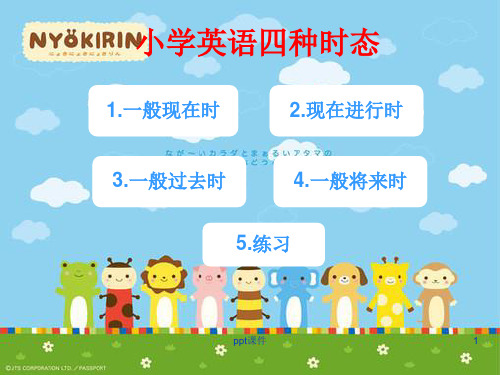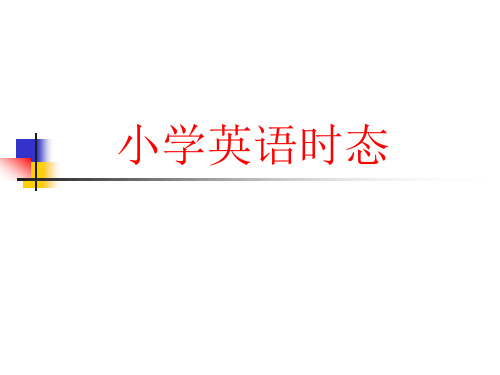小学英语四种时态课件
合集下载
小学英语四种时态 ppt课件

ppt课件 4
3. 一般疑问句 (1)Am / Is / Are+主语+表语+? Is your mother a nurse? 你妈妈是护士吗? Is Polly a bird? 波利是鸟吗? (2)Do+主语+动词原形+其它+? Do you like learning English? 你喜欢学习英语吗? Does your father go to work every day? ppt课件 你爸爸每天都上班吗?
5
4. 特殊疑问句
特殊疑问词+一般疑问句+? What is your father? 你爸爸是干什么的? What do you do every day? 你每天做些什么? When does your mother go to work every day? 你妈妈每天什么时候去上班?
ppt课件 6
13
1.The twins are ___________(wash) the washing clothes now. 2.Look! He is ________ playing(play) basketball over there. 3.Listen! ______ Sally _______(sing)? singing Is 4.What _____(be) you doing (do) are now.
注意,以下情况要使用一般现在时:
• 表示特征、性格和能力。如: Lifeng is a tall boy. 李锋是一个高个子男孩。 That's a big tree. 那是一棵大树。 My skirt is very new. 我的裙子很新。 She can speak English. 她会说英语。 2. 表示经常发生的或习惯性的动作。如: I get up at seven every day. 我每天7点起床。 Classes begin are seven days in a week. 一周有七天。 The earth goes around the ppt sun. 课件 地球绕着太阳转。
3. 一般疑问句 (1)Am / Is / Are+主语+表语+? Is your mother a nurse? 你妈妈是护士吗? Is Polly a bird? 波利是鸟吗? (2)Do+主语+动词原形+其它+? Do you like learning English? 你喜欢学习英语吗? Does your father go to work every day? ppt课件 你爸爸每天都上班吗?
5
4. 特殊疑问句
特殊疑问词+一般疑问句+? What is your father? 你爸爸是干什么的? What do you do every day? 你每天做些什么? When does your mother go to work every day? 你妈妈每天什么时候去上班?
ppt课件 6
13
1.The twins are ___________(wash) the washing clothes now. 2.Look! He is ________ playing(play) basketball over there. 3.Listen! ______ Sally _______(sing)? singing Is 4.What _____(be) you doing (do) are now.
注意,以下情况要使用一般现在时:
• 表示特征、性格和能力。如: Lifeng is a tall boy. 李锋是一个高个子男孩。 That's a big tree. 那是一棵大树。 My skirt is very new. 我的裙子很新。 She can speak English. 她会说英语。 2. 表示经常发生的或习惯性的动作。如: I get up at seven every day. 我每天7点起床。 Classes begin are seven days in a week. 一周有七天。 The earth goes around the ppt sun. 课件 地球绕着太阳转。
小学英语语法——时态(共17张PPT)

17
stop→stopped
plan→planned
动词过去式规则变化
10
表示过去发生的而现在已经结束的事情、动作或情况,
常和明确的过去时间状语连用,如:yesterday,
last week, three days ago等。
基 本
My brother got married last week.
用
本
用
用现在进行时表示将来,常用这种结构的动词有go,
法
come, leave, stay等位移性动词,表示即将发生或
安排好要做的事情。
We are leaving for Shanghai.
The bus is coming soon.
8
一般过去时
be动词型:句子的谓语动词只有be动词(was或were)。
C. got up
2. What did you see ________?
A. now
B. every day
C. just now
3. He went into the room and________ the door.
A. lock
B. locking
C. locks
4. ---What________ you ________ last week?
构
成
Are they swimming in the bedroom?
特殊疑问句:特殊疑问词+am/is/are+主语+动词的现在分词
+其它成分
Where are they swimming?
6
1. 一般情况下,直接在动词词尾加-ing。
小学英语时态课件

一般将来时否定句: 在be动词后面加not或情态动词will后加not won't
一般将来时般疑问句: be或will提到句首,some改为any;and改为or 第一、二人称互换。
5、Nancy is going to go camping. (改为否定)
Nancy _______going to go camping. 6、I'm go to get up at 6:30 tomorrow. (改为一般疑问句)
5.小学阶段不规则动词一般过去时
am/is→was
are→were
do→did
sing→sang
give→gave
run→ran
eat→ate
take→took
ride→ rode
drive→drove
get→got
go→went
know→knew
see→saw
buy→bought
have/has→had sit→sat come→came write→wrote speak→spoke make→made teach→taught
and I are______(make) a model plane. 12. Look, he is______(clean) the windows. 13. The boys______(run) with the cat now. 14. I can’t______(skate), but I can______(ski). 15. The students are______(draw) in the classroom. 16. My sister and I like______(listen) to music. 17. My father_______(watch) TV in the bedroom now. 18. There______(be) a lamp near the sofa. 19. What______he_____(do) now? He_______(swim) . 20. I like_____(jog). I can______(jog). I am_____ (jog) in the street now.
小学英语时态-PPT

一般现在时
(2) 当句子中即没有be动词,也没有情态动词时 ①陈述句:We get up at 7:00 every morning. 疑问句→Do you get up at 7:00 every morning? 否定句→We don’t get up at 7:00 every morning. ②陈述句:She has a little brother. 疑问句→ Does she have a little brother? 否定句→ She doesn’t have a little brother.
现在进行时
1. The boy is playing basketball. 否定句:____________________________ 一般疑问句:_________________________ 肯定回答:__________________________ 否定回答:__________________________
12. We _________ (not watch) TV on Monday.
13. Nick_______ (not go) to the zoo on Sunday.
14. They _________ (like) the World Cup?
按要求完成句子
1.Do you often play football after school? (肯 定回答) 2. I have many books. (改为否定句) 3. Gao Shan’s sister likes playing table tennis (改为否定句) 4. She lives in a small town near New York. (改为一般疑问句) 5. I watch TV every day. (改为一般疑问句) 6. David has got a goal. (改为一般疑问句)
英语四大时态复习课件ppt

• I lost much money last night.( C )
经营者提供商品或者服务有欺诈行为 的,应 当按照 消费者 的要求 增加赔 偿其受 到的损 失,增 加赔偿 的金额 为消费 者购买 商品的 价款或 接受服 务的费 用
改一般疑问句的方法:
①首先看有无be或情态动词,如果有,将be提到 句首并大写,句末打问号.
3对比
时态 现在进行 时
一般现在 时
一般过去 时
一般将来 时
表格对比学习
肯定句
否定句
一般疑问句
be+v-ing 在be 后加上not Be提到句首
(现在分词)
V -原形 V-s/es三单
在实义v.前用助动词 Do,Does 提
don’t ,doesn’t,行 到句首,实
为动词要还原
义动词还原
V-ed
化
Do you usually take the bus to work?
操
I don’t usually take the bus to work. 4.They are having classes.
练
Are they having classes?
They aren’t having classes.
判断时态形式:
A.现在进行时 B.一般现在时 C.一般过去时 D一般将来时
• He always likes playing the piano.( B )
• We are having an English classes now.( A)
• They often go home late.( B ) • Lucy is going to dance tomorrow.( D )
小学英语四种时态课件

+ing
ask
以不发音的e结尾 的,去e,+ing
write take
重读闭音节以一个 辅音字母结尾的, 双写这一字母+ing
get run swim
going
asking writing taking getting running swimming
你现在学习的是第13页,课件共29页
1.The twins _a__r_e_w__a_s_h_in_(gwash) the
你现在学习的是第2页,课件共29页
一般现在时的构成
1. 肯定句
(1)主语+am / is / are+表语
They are new students. 他们是新生。
(2)主语+行为动词+其它 I read English every night. 我每天晚上读英语 。
你现在学习的是第3页,课件共29页
词过去式改为实意动词的原形.
(四)提问:
What? When ? Where? How?
你现在学习的是第17页,课件共29页
动词-ed形式的构成:
在动词后加-ed
want
以字母e 结尾的动 词,只+d
“ 辅音字母+y ” , 变y 为i, 再+ed
重读闭音节以一个 辅音字母结尾的, 双写+ed
answer move
你现在学习的是第23页,课件共29页
小学英语动词的时态练习
❖ 一、选择填空:
❖ ( )1. Look! Li Ping and Li Ying ________ basketball now. ❖ A. play B. played C. are playing D. will play
小升初小学英语四大时态(课件)人教PEP版英语六年级下册

现在进行时
句型:主语+be+动词ing Tom is doing his homework.
第一人称+am+动ing 第二人称+are+动ing 第三人称+is+动ing 口诀:我用am,你用are,is用在他她它,单数名词使 用is ,复数名词使用are 定义:现在进行时表示现在或当前一般时间正在进行 的动作常与Listen,Look,now,Watch out…连用
cleaning
一般将来时
定义:表示将要发生的事或打算、计划、决定要 做的事情。常与tomorrow, tonight, next week/ weekend/ month/ year, this morning/ afternoon/ evening…连用
句型:主语+be going to+动词原形 主语+will+动词原形
现在进行时
动词ing的变化规律: 1)直接加ing ,如: open-opening, clean-
cleaning… 2) 去掉词尾不发音的e ,如:take-taking, come-
coming, have-having, become-becoming … 3) 重读闭音节的,双写最后的字母,加 ing , 如:
last year. 去年李梅总是步行上学。
动词过去式的规则变化
①一般情况,直接加上-ed。如:look-looked。 ②以不发音的字母e结尾的动词,加-d。如:
live-lived。 ③以重读闭音节结尾,先双写辅音字母,再加-
ed。如:stop-stopped
④辅音字母+y结尾的动词,先变y为i,再 加-ed。如:study-studied。
小学英语四种时态 谢PPT课件

9
4.There are (be)four seasons in a year.
5.Lily ____is____ (be) a tall girl. 6.I go (go)shopping once a week.
10
现在进行时(Present Progressive)
概念: 表示现在正在发生的动作h 或存在的状态
2. 表示经常发生的或习惯性的动作。如: I get up at seven every day. 我每天7点起床。 Classes begin at eight.8点开始上课。
3. 表示客观事实和真理。如:
There are seven days in a week. 一周有七天。
The earth goes around the sun. 地球绕着太阳转。
(四)提问谓语: What did + 主语+ do…? 如:Tom did his homework last night.
What did Tom do last night?
15
动词-ed形式的构成:
在动词后加-ed
want
以字母e 结尾的动 词,只+d
“ 辅音字母+y ” , 变y 为i, 再+ed
8
1.The twins ___w__a_s_h____(wash) the
clothes every day.
2.Sometimes he __p_l_a_y_s__ (play)
basketball over there.
3.How often d_o__e_s Sally _s_i_n_g__(sing)?
7
注意,以下情况要使用一般现在时:
4.There are (be)four seasons in a year.
5.Lily ____is____ (be) a tall girl. 6.I go (go)shopping once a week.
10
现在进行时(Present Progressive)
概念: 表示现在正在发生的动作h 或存在的状态
2. 表示经常发生的或习惯性的动作。如: I get up at seven every day. 我每天7点起床。 Classes begin at eight.8点开始上课。
3. 表示客观事实和真理。如:
There are seven days in a week. 一周有七天。
The earth goes around the sun. 地球绕着太阳转。
(四)提问谓语: What did + 主语+ do…? 如:Tom did his homework last night.
What did Tom do last night?
15
动词-ed形式的构成:
在动词后加-ed
want
以字母e 结尾的动 词,只+d
“ 辅音字母+y ” , 变y 为i, 再+ed
8
1.The twins ___w__a_s_h____(wash) the
clothes every day.
2.Sometimes he __p_l_a_y_s__ (play)
basketball over there.
3.How often d_o__e_s Sally _s_i_n_g__(sing)?
7
注意,以下情况要使用一般现在时:
- 1、下载文档前请自行甄别文档内容的完整性,平台不提供额外的编辑、内容补充、找答案等附加服务。
- 2、"仅部分预览"的文档,不可在线预览部分如存在完整性等问题,可反馈申请退款(可完整预览的文档不适用该条件!)。
- 3、如文档侵犯您的权益,请联系客服反馈,我们会尽快为您处理(人工客服工作时间:9:00-18:30)。
一般过去时
(三)一般疑问句 有be动词的句子中,把be动词提前即可(was /
were 放主语前) ,回答时用be动词回答;有实意动 词时,需要助动词did的帮助,将did提前即可,也就 是主语前加did (动词还原) ,回答时用did回答,注意 人称的变化及将实意动词过去式改为实意动词的原形.
(四)提问:
现在进行时(Present Progressive)
概念: 表示现在正在发生的动作 或存在的状态
结构: be (is, am, are) + doing
标志语: Look! 、 Listen! 、now
1、现在进行时的肯定句基本结构为be 动词ing.
2、现在进行时的否定句在be后加not。
3、现在进行时的一般疑问句把be动词调到句首。
❖ A. watch B. watched C. am watching
❖ ( )3. Can I______ this book? ❖ A. have B. has C. had
❖ ( )4. I to music at 7:00 this morning. ❖ A. listen B. listened C. listening
3. 一般疑问句
(1)Am / Is / Are+主语+表语+? Is your mother a nurse? 你妈妈是护士吗? Is Polly a bird? 波利是鸟吗?
(2)Do+主语+动词原形+其它+? Do you like learning English? 你喜欢学习英语吗? Does your father go to work every day? 你爸爸每天都上班吗?
3. 表示客观事实和真理。如: There are seven days in a week. 一周有七天。 The earth goes around the sun. 地球绕着太阳转。
动词第三人称单数形式的变化规则 1.一般情况下,直接加-s,
如:cook-cooks, milk-milks
2.以s. x. sh. ch. o结尾,加-es, 如:guess-guesses, wash-washes, watch-watches, go-goes
2. 否定句
(1)主语+am / is / are+not+表语 She is not a teacher. 她不是老师。
(2)主语+don't(doesn't)+动词原形+其它 I don't like learning math. 我不喜欢学习数学。 Liping doesn't like learning Chinese. 李苹不喜欢学习汉语。
小学英语四种时态课件
1.一般现在时( Present Simple)
概念: 表示习惯、经常性的动作
结构: do、 does
标志语:usually、often、never、
sometimes、once a week、 twice a month、every year
一般现在时的构成
1. 肯定句 (1)主语+am / is / are+表语 They are new students. 他们是新生。 (2)主语+行为动词+其它 I read English every night. 我每天晚上读 英语。
4. 特殊疑问句
特殊疑问词+一般疑问句+?
What is your father? 你爸爸是干什么的? What do you do every day? 你每天做些什么? When does your mother go to work every day? 你妈妈每天什么时候去上班?
注意,以下情况要使用一般现在时:
took swam drank had came put saw
1.The twins __w__a_s_h_e_d___(wash) the
clothes yesterday.
2.The day before yesterday he
_p_l_a_y_e__d_ (play) basketball over there. 3._D__id__ Sally _s_i_n_g__(sing) two hours
4、现在进行时的特殊疑问的基本结构为: 疑问词+be动词+主语+doing+其它? 但疑问词当主语时其结构为: 疑问词+be动词+doing+其它?
动词-ing形式的构成: go ask write take get run swim
going asking writing taking getting running swimming
ago?
4.What __d_i_d___(do) she do last nigth?
1.一般将来时( Future Simple)
概念: 表示将要发生的动作或存在
的状态
结构: will,be going to 标志语:tomorrow,the next day,
this afternoon, this evening,next week (month, year…),in the year 2022
3.How often d_o__e_s Sally _s_i_n_g__(sing)?
4.There are (be)four seasons in a year. 5.Lily ____is____ (be) a tall girl. 6.I go (go)shopping once a week.
What will he do next week? (三)疑问形式:
be 或will 放主语前(some改为any ) (四)否定式:
be 或 will 后加 not will not = won’t
1.The twins __w_i_ll_w__a_s_h__(wash) the clothes tomorrow.
❖ ( )7. Where you last night?
❖
A. was B. are C. were
❖ ( )8. Can I TV? Sure.
❖
A. watching B. watch C. watched
❖ ( )9.She like summer.
❖
A. doesn't B. don't C. didn’t
now.
一般过去时(Past Simple)
概念: 表示过去发生的动作或存 在的状态
结构: did
标志语:yesterday、... ago、in 1990、
last week/month、at that time 等
一般过去时
(一)肯定句: ①主语 + be动词的过去式 + 过去时间。
动词be 的过去时(was, were)
❖ ( )10. There _______ a table in Jenny’s room.
❖
A. am B. is C. are D. were
小学英语动词的时态练习
❖ 二、用动词的适当形式填空。 ❖ 1、Tom will swim (swim) in the river the day
after tomorrow. ❖ 2、Why were (be) they not here yesterday? ❖ 3、Yesterday afternoon they played (play)
worker. ❖ 8、Look! Jim and Tom are running (run) there.
过去式之歌 过去式构成有方法,一般词尾加ed。 如果词尾有个e,直接加d就可以。 辅音字母y在尾,变y为i加ed。 “一辅重闭”作尾巴,双写之后加ed。 标准过去式加ed,少量不规则分别记。 am和is对was,are要变were没问题。 have和has用had,do和does变did。
football with their English teacher. ❖ 4、It’s eight o’clock now.The boys are watching(watch)
TV. ❖ 5、She usually does (do) her homework in the
evening. ❖ 6、Tom and Tony can’t swim (swim). ❖ 7、What does your father ___d_o__ (do)? He’s a
3.以“辅音字母 y”结尾,变y为i, 再加-es, 如study-studies
1.The twins ___w__a_s_h____(wash) the
clothes every day.
2.Sometimes he __p_l_a_y_s__ (play)
basketball over there.
2.Next week he _w_i_ll_p_l_a_y_ (play) basketball over there.
3._W__il_l _ Sally __s_in_g__(sing) this evening?
4.What __w_i_ll__(dቤተ መጻሕፍቲ ባይዱ) she do in the year 2013?
②主语 + 实意动词过去式 + 过去时间
took pictures, climbed mountains, …
(二)否定句: 一般过去时中变否定句,有be动词时,在was 或were后面加not,变成wasn’t或者weren’t; 在有实意动词的句子中在实意动词前加didn’t, 将实意动词过去式改为实意动词的原形即可 take pictures, climb mountains 。
